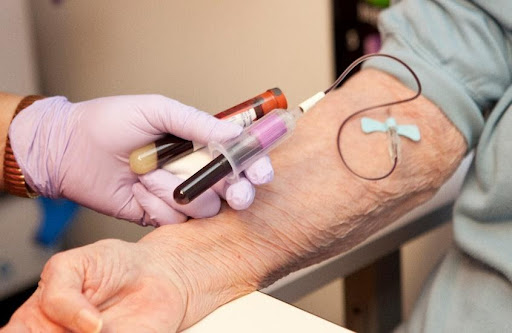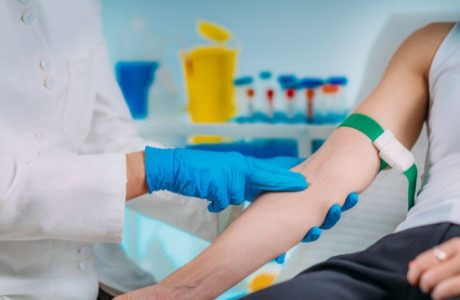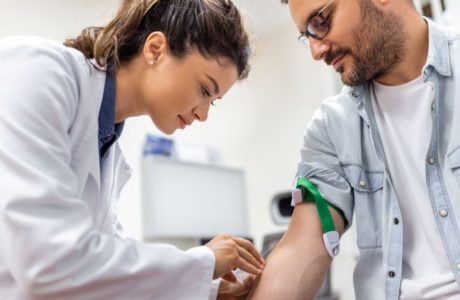Phlebotomy technician classes are the first step you should take if you’re interested in choosing a career that plays an essential role in healthcare. As a phlebotomist technician, you’ll be responsible for drawing blood, which is a critical task in medical procedures, diagnostics, and overall positive patient outcomes. Whether you’re looking to start a new career or expand your skills in the medical field, taking classes to become a phlebotomy technician can equip you with the knowledge and hands-on experience you need. You can learn a lot in this education path, including how to:
- Draw blood
- Communicate with patients
- Understand lab procedures
- Prevent infection and keep patients safe
- Maintain professionalism
Ready to learn more about these crucial phlebotomy skills? Let’s dive in!
Start your career journey with Training Direct!
1. Blood Draw Techniques
At the heart of phlebotomy is the ability to accurately and safely draw blood. Although there are a lot of job duties required in this role, it’s safe to say drawing blood is the foundation of the profession. Phlebotomy technician classes are designed to teach you the different techniques used for blood collection, including:
- Venipuncture (drawing blood from a vein)
- Capillary puncture (a small skin prick)
Phlebotomy technician classes can give you the hands-on experience you need to learn these skills using different methods and tools, from traditional needles to modern devices.
You can also learn about the anatomy of veins, understanding how to locate veins for optimal blood draw, and how to handle different patient types, like those with difficult veins or fear of needles. It’s not just about the “how-to” of drawing blood, but also the “when and why” of each technique. Understanding when to choose one method over another, based on the patient’s condition or the type of test, is crucial.
Some other key skills you may gain include:
- Proper needle insertion techniques
- Selecting the correct site for venipuncture
- Proper handling and collection of blood samples
- Troubleshooting difficult draws
Mastering these techniques ensures that you can perform blood draws safely and effectively while minimizing patient discomfort.
2. Patient Communication Skills
While phlebotomists are primarily focused on blood collection, their ability to interact with patients is just as important. Phlebotomy technician classes don’t just teach technical skills; they also emphasize the importance of communication. As a phlebotomy technician, you will most likely interact with patients from all walks of life. Many of them may be nervous or anxious about the procedure. Clear, compassionate communication can help alleviate these fears and build trust.
Phlebotomy technician classes can teach you how to:
- Put patients at ease: Establish a calm, reassuring presence to reduce anxiety and help the patient feel more comfortable.
- Explain the procedure: Give clear instructions on what the patient should expect during the blood draw.
- Demonstrate empathy: Be sensitive to patient concerns, especially with pediatric, elderly, or needle-phobic patients.
- Handle difficult situations: If a patient becomes uncooperative or anxious, it’s important to know how to de-escalate the situation.
By learning how to communicate effectively and compassionately, you ensure that the patient feels safe, understood, and comfortable during the procedure.
3. Understanding Laboratory Procedures
A phlebotomy technician doesn’t just draw blood; they also need to understand what happens after the blood is collected. While enrolled in classes to become a phlebotomy technician, you can learn the basic laboratory procedures involved in processing blood samples. This knowledge is important because it ensures that the blood samples are properly prepared and transported for analysis.
You can also learn about:
- Specimen handling: How to properly label, store, and transport blood samples to prevent contamination or degradation.
- Blood sample processing: An understanding of how blood samples are analyzed in the lab, from centrifugation to preparing slides for microscopic examination.
- Test-specific requirements: Different tests may require different sample preparations. For example, some tests require fasting blood samples, while others require specific collection tubes.
Having a basic understanding of laboratory procedures will allow you to better understand the importance of your role in the overall healthcare process. This knowledge is also helpful because you can ensure samples are handled properly and common mistakes that could compromise test results are avoided.
4. Safety and Infection Control
Safety and infection control are critical components of phlebotomy. Learning how to safely handle blood and draw blood cannot be overstated! Bloodborne pathogens such as HIV, Hepatitis B, and Hepatitis C are potential risks when working with blood samples, so knowing how to protect yourself and others is essential. Phlebotomy technician classes can teach you the latest safety protocols, from hand hygiene to the proper disposal of needles and blood samples.
Some of the key topics covered in phlebotomy technician classes include:
- Personal Protective Equipment (PPE): How to properly wear gloves, masks, and gowns to protect yourself and the patient during the procedure.
- Needle safety: Safe handling and disposal of needles to prevent needle-stick injuries.
- Sterilization procedures: Ensuring that all equipment is sanitized to avoid cross-contamination.
- Infection control policies: Understanding and following standard precautions, isolation precautions, and other hospital or lab-specific infection control policies.
By mastering these safety protocols, you can prevent the transmission of diseases and protect both yourself and your patients.
5. Professionalism in Healthcare Settings
Phlebotomists are sometimes the first point of contact in a healthcare setting, and as such, professionalism is crucial. If a patient has a bad experience with a phlebotomist, this can sour the rest of their appointment or health care. Phlebotomy technician classes can prepare you to act with the highest level of professionalism, ensuring that you’re well-prepared to interact with patients, colleagues, and supervisors in a healthcare environment.
In addition to the technical skills you may learn, phlebotomy technician classes can teach you:
- Confidentiality and HIPAA regulations: Understanding patient privacy and how to maintain confidentiality at all times.
- Time management: Phlebotomists must often juggle multiple tasks, so learning to manage your time effectively is key.
- Adaptability: Healthcare environments can be fast-paced and unpredictable, so learning how to adapt to changing situations is crucial.
- Teamwork: While phlebotomists often work independently, they are also part of a healthcare team. You’ll learn how to communicate and collaborate with other medical professionals.
A professional attitude not only ensures that you provide high-quality care to your patients, but it also helps you build a strong reputation in the healthcare community.
Becoming a phlebotomy technician is an exciting and rewarding career choice. Through phlebotomy technician classes, you can gain the skills and knowledge necessary to perform this essential role in the healthcare system. From learning how to draw blood accurately to mastering safety protocols, communication skills, and professional behavior, these classes provide the foundation for a successful career.
Pursue Phlebotomy technician classes at Training Direct
If you are ready to enroll in phlebotomy technician classes and take the next step in pursuing your new career, Training Direct can help you get on your way. The Phlebotomy Technician program at Training Direct is designed to help students obtain the knowledge and skills necessary to pursue entry-level jobs as a phlebotomy technician. In addition, the program at Training Direct will expose students to topics such as the collection, processing, and distribution of laboratory specimens according to established procedures. During the Phlebotomy Technician program at Training Direct, emphasis will be placed on safety standards, legal and ethical considerations, as well as quality control procedures.





